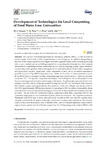Development of Technologies for Local Composting of Food Waste From Universities

Ver/Abrir
Use este enlace para citar
http://hdl.handle.net/2183/25641Colecciones
- Investigación (FCIE) [1228]
Metadatos
Mostrar el registro completo del ítemTítulo
Development of Technologies for Local Composting of Food Waste From UniversitiesFecha
2020-05-01Cita bibliográfica
Vázquez, M.A.; Plana, R.; Pérez, C.; Soto, M. Development of Technologies for Local Composting of Food Waste from Universities. Int. J. Environ. Res. Public Health 2020, 17, 3153. https://doi.org/10.3390/ijerph17093153
Resumen
[Abstract] The amount of biowaste generated by university canteens (BWUC) in the faculties of the University of A Coruña (UDC) varies between 6 and 100 kg/day. In addition, the gardening services of the campus generate even higher amounts of garden waste (GrW), including pruning, which, once crushed, serves as bulking material for composting the biowaste from the canteens. Decentralized composting has been chosen with the aim of producing high quality organic fertilizers for university urban gardens while reducing the environmental burdens of both waste management and agricultural practice. Small static home composters of 340 L (SHC) for smaller amounts of generation (up to 20 kg BWUC/day) were used, while, for faculties of higher generation (up to 40 kg BWUC/day on average), the first composting stage was carried out in a closed and dynamic composter (DC). The dynamic composter was designed and built specifically for this project and its features were improved and optimized throughout the study. The pilot project was carried out in two centers of the UDC, which are known as the Philology Faculty (PF) and the School of Architecture (SA). All the organic waste generated by the canteens of these two colleges from January 2011 to July 2011 (approximately 3000 kg) was treated. Composting in SHC included a thermophilic phase that extended one month beyond the loading period for which thermophilic temperatures were also recorded. The use of the DC as the first stage in combination with static composters (SC) for the maturation stage reduced the overall thermophilic phase to 6–8 weeks. The complete maturation (Rottegrade class IV-V) was achieved after about four months in SHC and after two months when using the combined DC-SC system, if the right conditions of moisture were maintained. The chemical quality of the compost produced was compatible with Class A of Spanish legislation (equivalent to organic farmer quality) and the C/N ratio ranged from 9 to 15 depending on the relation BWUC:GrW.
Palabras clave
Decentralized composting
Static composters
Dynamic composter
Food waste
University
Static composters
Dynamic composter
Food waste
University
Versión del editor
Derechos
Atribución 4.0 Internacional
ISSN
1660-4601






